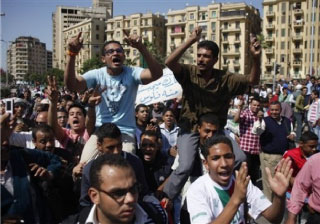[Untold Story of the Egyptian Revolution, which can be viewed at http://www.youtube.com/watch?v=frtpwNYc980]).

The Revolution Cannot Be Rolled Back
(The Egyptian people are refusing to leave Tahrir Square. They keep coming back, to demand a say in the shape of things to come; to demand punishment for Mubarak and the confiscation of the public money stolen by him; to protest against the bans on strikes imposed by the military. Below, we carry an abridged version of a report on the workers’ struggle in Egypt today, by Carl Finamore, a US Labour activist who has made a short video on labour’s role in the Egyptian revolution
[Untold Story of the Egyptian Revolution, which can be viewed at http://www.youtube.com/watch?v=frtpwNYc980]). 
Tens of thousands filled Tahrir Square once again on April 1, emphatically demonstrating the utter failure of prolonged attempts by Egypt's military government to demobilize and demoralize the pro-democracy movement.
Fifteen thousand people, already attending the Friday Muslim prayers in Tahrir Square, were joined later in the afternoon by twice as many protesters jamming the central Cairo plaza. In what was called “The Friday for Rescuing the Revolution," protesters demanded bringing to trial deposed President Hosni Mubarak and his cronies, ending the official state of emergency and releasing all political prisoners.
In fact, important sections of the population continue to call for serious and fundamental democratic reforms, going far beyond the transparently shallow changes to Mubarak's discredited constitution recently suggested by the top generals.
Nonetheless, the military did successfully cast the March 19 constitutional referendum as the best chance to stabilize the economy and to move more quickly toward civilian rule, thus producing very large voter turnout and approval.
This despite the fact that many leading democracy activists attacked the government’s amendments as a tepid rewrite of a few clauses in the dictator’s carried-over constitution, minus any additional firm guarantees of civil liberties.
The Egyptian Center for Trade Union & Worker Services (CTUWS), a leading advocate of the newly-formed Egyptian Federation of Independent Unions (EFITU), produced a leaflet urging people to vote against amendments that were the very same “previously proposed by the deposed President Mubarak….[and] to demand a new constitution that lays the foundations for a new Egypt.”
The CTUWS also organized “a ‘Vote No’” demonstration of around 3,000 students, human rights activists and trade unionists in Tahrir Square on March 27. Furthermore, the AFL-CIO-supported Solidarity Center (SC) in Washington DC pointed out that “yes” numbers were boosted significantly because separate votes were not allowed on any of the nine proposed amendments.
The opposition in Egypt actually sought a whole new alternative constitution that could be developed by a broad cross-section of the movement. But, activists felt, there was insufficient debate, and “people thought they were voting for a little bit more democracy so it passed overwhelmingly.”
Reforming the constitution while banning strikes?
Even more dangerous than this apparent constitutional deception, however, is last week’s proposal by cabinet ministers to ban strikes and protests. It includes onerous fines and gruelling prison terms for any violations. This draft legislation is now under serious consideration by the ruling Supreme Military Council.
If eventually ratified and enforced, all organized government opposition would be silenced. These ominous threats have, as a result, accelerated demands to suspend the state of emergency in effect since 1981 and under which such restrictions could legally be enacted. This was one of the central demands of those assembled on April 1.
On the one hand, the Supreme Council desperately attempts to demobilize and malign the reform movement either through malicious accusations of economic sabotage or through actual physical threats. At the same time, the ruling Council periodically concedes a number of important reform demands, many of which are prudently announced several days before major protests.
After rebellion comes confidence
In the country’s large industrial and commercial sectors, incredibly massive organized protests involved significant sections of the working class and poor. Their participation left a larger political footprint than other recent social explosions in the Middle East.
“You cannot understand events in Egypt today without understanding the absolutely critical role of the working class - both before, during and after the Tahrir Square events,” according to prominent labour lawyer Khaled Ali in a televised interview. “For example, there is absolutely no doubt that the isolation of the students and young people in the Square was ended once workers began conducting strikes and protests, about 30-40 a day throughout the country during the revolutionary Tahrir days and in the immediate days following. The role of the working class was absolutely decisive to our victory,” concluded Ali. Massive working class involvement in the rebellion has provided much-needed confidence for its participation in the next stage of the struggle.
Today, different classes, sectors and strata of society that stood shoulder to shoulder in Tahrir, Alexandria and in the Suez, are now quite naturally each promoting their own specific social, political and economic programs.
Democratic rights won by the revolution have allowed this immensely important debate to occur openly and the results will determine whether the gains of the people’s uprising will be limited to the business sector and upper classes or extended also to the working class and poor majority.
What next?
Judging by the large turnout and overwhelming approval numbers during the constitutional referendum, the army was successful in sidetracking discussion away from self-organization of the people and into the safer and more familiar terrain of parliamentary reforms where, as noted earlier, the traditional elite can more easily reassert themselves through their existing political parties and economic structures.
For example, the rarely-enforced minimum wage is still only a paltry $74 a month after recently seeing its first increase since 1984, where it remained at $6.50 a month for 26 years.
Millions continue to languish in poverty, forced to work several jobs in the informal sector as street vendors or in one of the Qualifying Industrial Zones, exclusively reserved for U.S. companies where wages are low, benefits non-existent and unions severely repressed.
But, on the other hand, the steady presence of independent unions is growing stronger each day. Teachers, healthcare workers, textile workers, transport workers, tax collectors and other sectors continue to form unions, breaking from the government-controlled official union and joining the independent union federation, EFITU, only just formed on March 2. “We are concentrating most on organizing the working class because we know that ultimately this is the only way to gain our share of democracy and a decent standard of living,” an activist declared. “Workers here have no experience with free and independent unions, it is all new to us. But we are very, very happy with our progress so far.”
As long as the debate on Egypt’s future continues with full participation of an organized working class and its allies among the poor, students and middle classes, so also will the uprising’s social, economic and political goals stay on track and become more possible to achieve. .